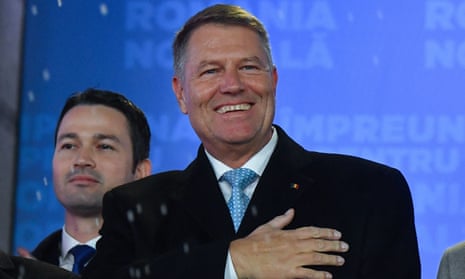Romania’s centrist president, Klaus Iohannis, has easily won a runoff vote as expected, confirming the pro-European trajectory of the eastern EU member state.
Thirty years after the fall of communism, the centre-right former physics professor won slightly more than 63% of the vote with 95% of ballots counted.
His opponent, Social Democrats (PSD) leader and former prime minister, Viorica Dancila, received the remaining 37%, the worst-ever result for her party, which has dominated post-communist Romania.
“I promise to be a president for all Romanians ... A modern, European, normal Romania won today,” a jubilant Iohannis said.
The 60-year-old from the German minority, who already staged a surprise win over the PSD in 2014, has campaigned to help build functioning institutions without corruption.
The election was fought against a backdrop of deep resentment over controversial judicial reforms seen to benefit PSD politicians, which led to massive street protests and irked Brussels.
The PSD-led government collapsed in October in a no-confidence vote, capping months of political uncertainty under the left-wing party.
A total of 18.2m Romanians were eligible to vote, including a record 650,000 voters abroad. Part of a four million-strong diaspora who have emigrated in search of better paying jobs, they have tended to favour liberal candidates.
The PSD government had engaged in a long battle with the European Union over allegations it was trying to push through the measures to neuter the judiciary. Iohannis backed Brussels in the dispute.
The left-wing party, which was seen as the successor of the ruling elite before the overthrow of communism, had been accused of widespread corruption.
While nationalism has been less present in Romanian politics than elsewhere in the region – such as in Hungary or Poland – the PSD tried to frame its clashes with EU institutions as evidence that it was standing up for Romania.
Under the constitution, Romania’s president is responsible for foreign affairs as well as approving the appointment of judges and top prosecutors.
Hundreds of thousands of Romanians have protested against the judicial reforms proposed by the PSD, seen as giving politicians a way to avoid corruption sentences.
The PSD, which has become increasingly reliant on an ageing, rural electorate, has accused Iohannis of being a “dictator”. Criticised for refusing any face-to-face debate during the campaign, Iohannis, in turn, called his rival the “incarnation of a toxic regime”.
Dancila, 55, an engineer by training, had highlighted the strong economic growth recorded during the PSD’s time in office, including increases in pensions and public sector salaries.
But this largesse has sparked concerns by the European Union and the International Monetary Fund, which has warned about the country’s rising deficit.
In May, the PSD’s former chief and strongman Liviu Dragnea was jailed on corruption charges, and the party also saw its support plunge during European elections.
